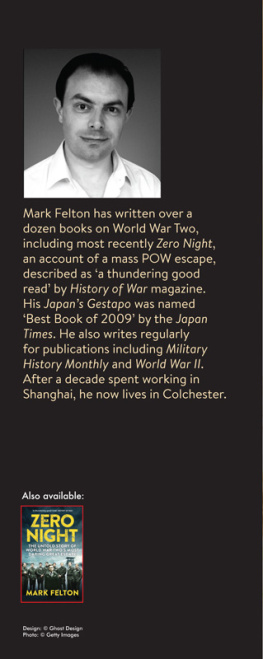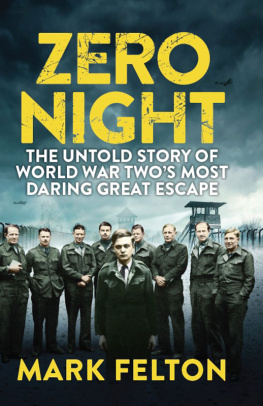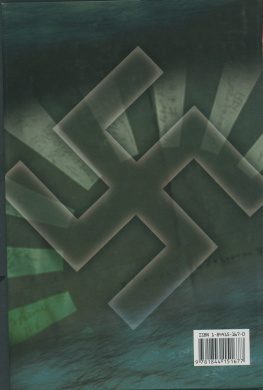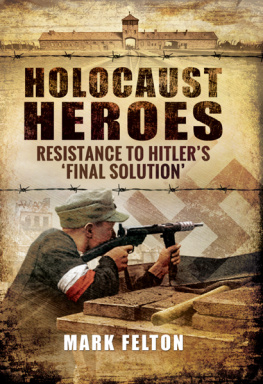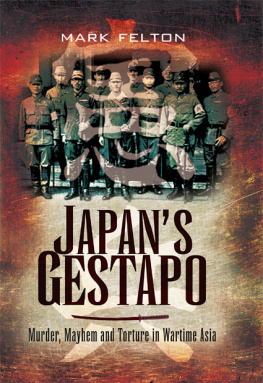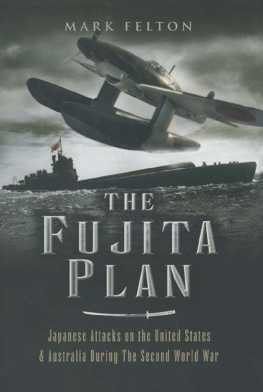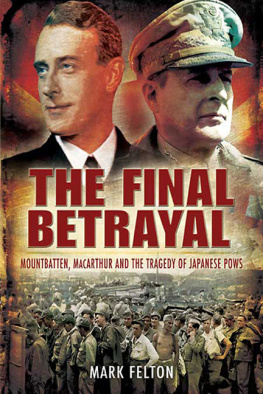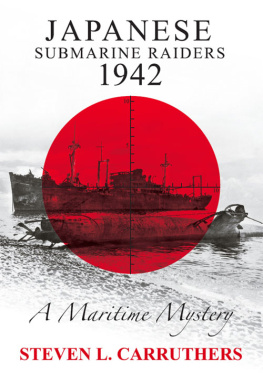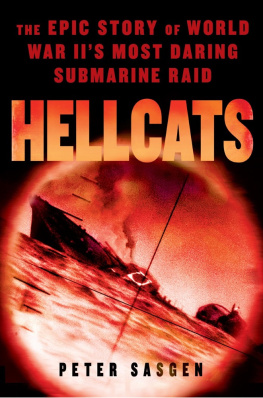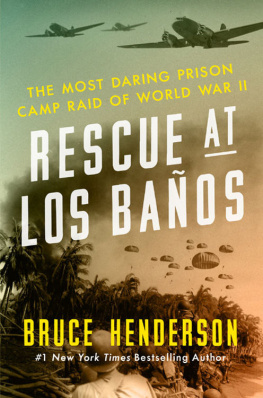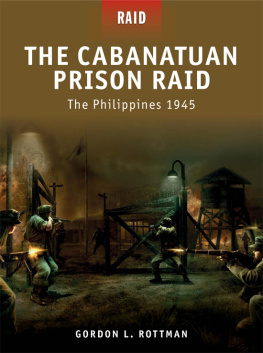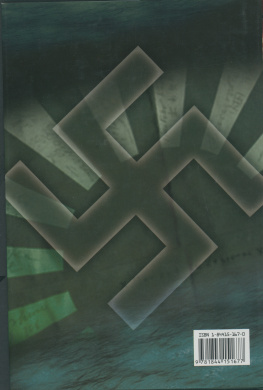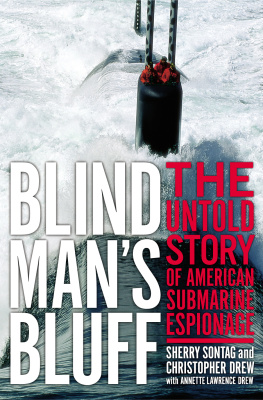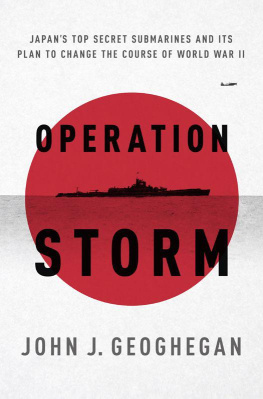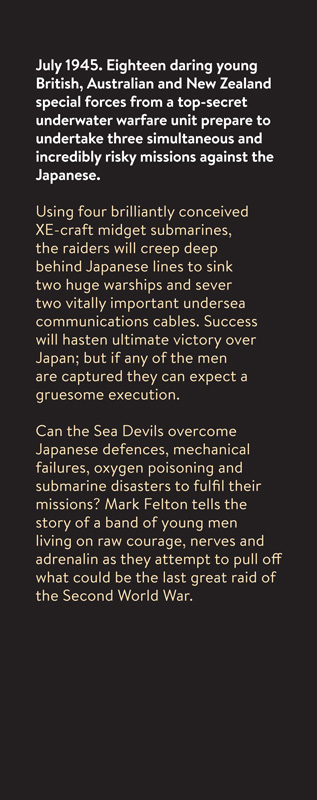THE SEA
DEVILS
Also by Mark Felton
Zero Night: The Untold Story of World War Twos
Most Daring Great Escape
THE SEA
DEVILS
OPERATION STRUGGLE AND THE
LAST GREAT RAID OF WORLD WAR TWO
MARK FELTON

Published in the UK in 2015 by
Icon Books Ltd, Omnibus Business Centre,
3941 North Road, London N7 9DP
www.iconbooks.com
Sold in the UK, Europe and Asia
by Faber & Faber Ltd, Bloomsbury House,
7477 Great Russell Street,
London WC1B 3DA or their agents
Distributed in the UK, Europe and Asia
by TBS Ltd, TBS Distribution Centre, Colchester Road,
Frating Green, Colchester CO7 7DW
Distributed in Australia and New Zealand
by Allen & Unwin Pty Ltd,
PO Box 8500, 83 Alexander Street,
Crows Nest, NSW 2065
Distributed in South Africa by
Jonathan Ball, Office B4, The District,
41 Sir Lowry Road, Woodstock 7925
Distributed in India by Penguin Books India,
7th Floor, Infinity Tower C, DLF Cyber City,
Gurgaon 122002, Haryana
ISBN: 978-184831-994-3
Text copyright 2015 Mark Felton
The author has asserted his moral rights.
No part of this book may be reproduced in any form, or by any
means, without prior permission in writing from the publisher.
Typeset in Adobe Text by Marie Doherty
Printed and bound in the UK by Clays Ltd, St Ives plc
To Fang Fang,
with love
Acknowledgements
I should like to extend my thanks to the following people, institutions and organisations for their superb and generous help during the researching of this book.
My very great thanks to former Sub-Lieutenant Adam Bergius, DSC, who, in 1945, was one of HMS XE-4s brave and daring divers during Operation Sabre off Saigon. He very generously and patiently answered all of my questions.
Many thanks to William Fell, CMG, grandson of Captain W.R. Tiny Fell, CMG, CBE, DSC, RN, Commanding Officer of 14th Submarine Flotilla, for his fascinating insights into his grandfathers life and access to family documents and photographs.
Thanks are due to Jane Gilbert and her family for sharing documents and photographs relating to her father, Vernon Ginger Coles, DSM, who sadly passed away during the writing of this book.
A great many thanks to Donald Fullarton, Helensburgh Heritage Trust; Ron Rietveld, The Submariners Association, West of Scotland Branch; Emily Morris, Churchill Archives Centre, Churchill College, Cambridge; David Barnes, Old Worcester, New Zealand; Paul Johnson, The National Archives (Public Record Office), Kew; Shehara Begum, Imperial War Museum, London; Ellis Barker, Newbury Weekly News; Shirley Felton for assistance with research material; The National Maritime Museum, London; Chatham Historic Dockyard; Alison Firth and Stephen Courtney of The National Museum of the Royal Navy; and the kind contributors to the World Naval Ships Forum.
Many thanks to my splendid agent Andrew Lownie, whose encouragement and advice are always very much appreciated.
The team at Icon Books have been fabulous, and my thanks to my editors Duncan Heath and Robert Sharman.
Once again my accomplished wife Fang Fang proved to be a willing sounding board and unpaid research assistant, and most importantly lent me her critical eye during the gestation of this book. Her love, wise suggestions and generous support continue to be invaluable to me and I cant thank her enough.
A note on the text
Most of the dialogue sequences in this book come from the veterans themselves, from written sources, diaries or spoken interviews. I have at times changed the tense to make it more immediate. Occasionally, where only basic descriptions of what happened exist, I have created small sections of dialogue, attempting to remain true to the characters and their manners of speech.
List of abbreviations used in the text
CBE | Commander of the Order of the British Empire |
CO | Commanding Officer |
DSEA | Davis Submarine Escape Apparatus |
DSC | Distinguished Service Cross |
DSO | Distinguished Service Order |
ERA | Engine Room Artificer |
HMNZS | His Majestys New Zealand Ship |
HMS | His Majestys Ship |
HT | Handie-Talkie, Motorola SCR-536 |
IJN | Imperial Japanese Navy |
LST | Landing Ship Tank |
MBE | Member of the Order of the British Empire |
PO | Petty Officer |
RAF | Royal Air Force |
RNR | Royal Naval Reserve |
RNVR | Royal Naval Volunteer Reserve |
SEAC | South East Asia Command |
USAAF | United States Army Air Force |
USS | United States Ship |
VC | Victoria Cross |
W&D | Wet and Dry Compartment |
XO | Executive Officer, second-in-command of a vessel |
List of Illustrations
Unless otherwise specified, images are from the Fell family collection, all rights reserved.
The commanding officers of the four XE-craft submarines used in Operations Struggle, Foil and Sabre: Lieutenant Jack Smart, Lieutenant Tich Fraser, Lieutenant Pat Westmacott, and Lieutenant Max Shean. (Photo: Imperial War Museum)
Prologue
Y ou are all sentenced to death by beheading, stated Colonel Masayoshi Towatari, the president of the court. His face betrayed no emotion, his dark eyes flicking across the faces of the ten defendants who stood before him. There was a sharp intake of breath among the British and Australian servicemen, who looked lean and hollow-cheeked from months of brutal imprisonment.
But, sir, we are prisoners of war, exclaimed Major Reginald Ingleton, the 25-year-old senior surviving officer of Operation Rimau. Ingletons face was badly bruised on one side from the beatings that he had suffered, his uniform dirty and torn, but he still had the air of a leader about him and the others looked to him in this, their moment of greatest despair. Ingleton, a Royal Marine, stood ramrod straight, his eyes burning with intense anger and his voice cracking as he spoke. We were captured in British uniform attacking legitimate military targets. We have rights under the Geneva Before Ingleton could finish his sentence a small and wiry Japanese major, his white armband emblazoned with red characters indicating membership of the dreaded Kempeitai military police, jumped up from his chair near the prisoners, the hilt of his sheathed samurai sword banging loudly on the table in front of him. Red faced, he bellowed out a long stream of guttural Japanese at them. Although Ingleton and his men understood little, the tone was unmistakable.
Colonel Towatari muttered something in Japanese to the major, who abruptly stopped shouting, bowed stiffly and then resumed his seat, a malevolent look on his face. Turning to Ingleton, Towatari continued in heavily accented English, The verdict of the court has

